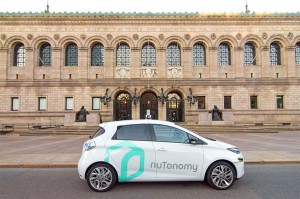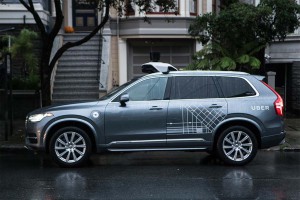Lyft has become the latest ride-sharing service to begin testing autonomous vehicles.`
The pilot program, launched in Boston this week, is being run in partnership with self-driving tech firm nuTonomy. Lyft has also been working with both Ford Motor Co. and General Motors, two carmakers that share its long-term goal of going completely driverless in a bid to slash costs while also improving safety.
“Based on feedback from pilot participants, nuTonomy’s engineers will adapt and improve our system, so that we can deliver an autonomous transportation experience that is extremely safe, efficient, and comfortable,” nuTonomy said in a statement.
Lyft’s autonomous pilot program follows similar efforts by arch-rival Uber, which has put self-driving vehicles into use in several communities, including both Phoenix and Pittsburgh. Meanwhile, Waymo has been running an autonomous ride-share pilot of its own in the Phoenix area and, last week, the Google spin-off’s CEO John Krafcik said he is looking at the option of expanding into other cities.
(Ford moving EV production to Mexico to open up Michigan plant for driverless vehicles. Click Here for the latest.)
It will shortly add some fully driverless vehicles to the Phoenix program. Uber is running some driverless models in that Arizona city, as well, though some recent incidents have raised concerns about safety.
For now, Lyft will stick with autonomous vehicles, meaning a driver will be stationed behind the wheel, ready to assume control in the event of any problems.
The first semi-autonomous vehicles, such as Cadillac’s CT6 with Super Cruise and the Tesla Model S with Autopilot, are already available for retail buyers and fully self-driving models are expected to reach showrooms by the end of the decade. Such vehicles are expected to not only ease driver stress but improve highway safety and reduce congestion.
But a number of traditional automakers, start-ups and suppliers are moving towards next-level technology that can eliminate the need for a driver entirely. GM plans to begin production by 2019, it announced last week, Ford following in 2021. Driverless vehicles will initially target fleet buyers, and largely “is being pushed by ride-sharing services,” Gil Pratt, the director of the Toyota Research Institute, said during an appearance at the Los Angeles Motor Show last week.
(Click Here for more about GM’s ride-sharing plans.)
Currently, Pratt noted, it costs an average $1.65 per mile for a trip in a ride-share vehicle, about 80 cents more than for a personally owned automobile. Companies like Lyft and Uber have estimated that they can drop their costs using driverless vehicles to the point where they will be less expensive than a privately owned vehicle. And the Boston Consulting Group recently estimated that as much as a quarter of all travel on U.S. roads by 2030 will be taken in driverless ride-share vehicles.
The Boston program marks a first step for Lyft, which is racing to catch up with rivals like Uber and Waymo. The San Francisco-based company has launched its own autonomous research program but also is partnering with a number of companies that could help it speed up development. That includes both Ford and GM – the larger maker investing $500 million in Lyft in 2016. The ride-sharing service also is working with Waymo and nuTonomy.
The latter tech firm, based in Cambridge, Massachusetts, was purchased by auto supplier Delphi in October for $450 million. Delphi itself recently spun off its traditional powertrain unit while renaming itself Aptiv. It plans to focus on next-generation vehicle technologies, including autonomous driving.
(Chinese ride-sharing giant Didi eyeing opportunities in North America. Click Here for the story.)



